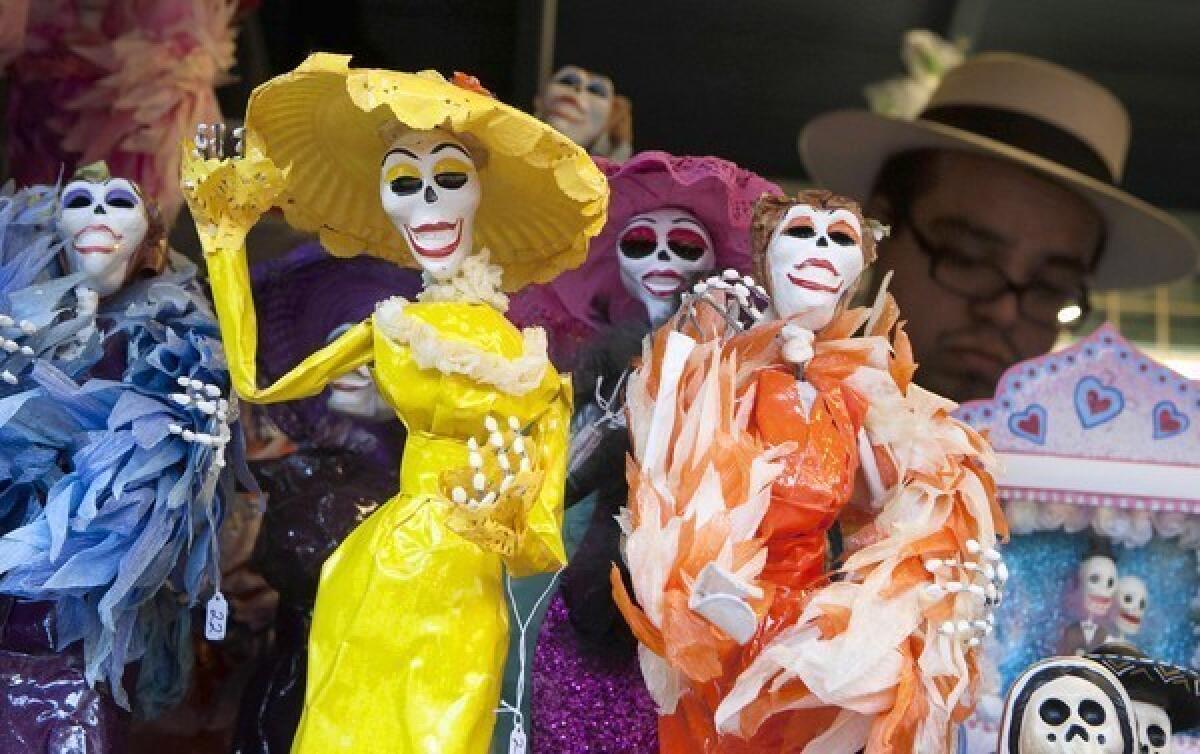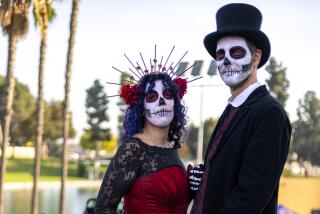Merchants in L.A.’s birthplace reluctantly embrace Web for funding

The board members of the Olvera Street Merchants Assn. stared at Edgar Pasten, a bit bewildered, when he suggested they use a website called Kickstarter to raise money for their Dia de los Muertos festivities.
In past years, the city had guaranteed the association $50,000 to support multiple cultural events at the “birthplace of Los Angeles.” But with new competition for city funds, the merchants needed to find another way to put on the Day of the Dead celebration.
Pasten, whose wife is a fifth-generation Olvera Street business owner, suggested the group try the website that enables people to donate to campaigns they find worthy.
But most in the room that day — Pasten, at 33, was among the youngest — couldn’t understand why anyone would just give them money.
Their reluctance was an illustration, said Pasten’s wife, Christina Mariscal-Pasten, of the generational divide that has been growing among the merchants as computers and technology have become staples of everyday life.
On Olvera Street, a romanticized version of old Mexico remains frozen in time. Traditional garments line the walls of shops and kiosks, wooden toys and trinkets like those that generations of Mexican children have played with are on display.
“If two or three people [at the meeting] had heard of Kickstarter, that would be a lot,” said 58-year-old Michael Mariscal, Pasten’s father-in-law. “We’re not that kind of people.”
The merchants were not sold on the fundraising platform, but found themselves in a difficult position.
The city was planning to allow corporations and other merchant groups to bid on sponsoring the event. The Olvera Street Merchants Assn. could apply for city funding, but if a commercial sponsor outbid them, Pasten said, the merchants feared they would commercialize Dia de los Muertos — much as they had done with other cultural events, such as Cinco de Mayo.
The Dia de los Muertos festivities, in which families honor deceased relatives, is a spiritual celebration. It includes Aztec rituals and processions that stem from the Catholic tradition.
With no other funding opportunities on the horizon, the merchants decided to give Kickstarter a try, setting a goal of $10,000.
Initially, they found it frustrating.
One merchant complained about Kickstarter’s policy of only giving campaigns money if they reached their fundraising goals. But most of the reluctance to use Kickstarter, Mariscal-Pasten said, came from a lack of understanding how it worked.
Many of the older merchants aren’t tech-savvy, Michael Mariscal said, pointing to himself as an example. He doesn’t have an email address and does not like using cellphones.
Norma Garcia, whose family has been on Olvera Street since its inception in 1930, put it simply: “I am very old and I am not really into computers.”
During the campaign, Pasten and his wife used social media sites to publicize the campaign.
Through retweets and Facebook shares, they were able to promote Olvera Street and received donations from as far away as Mexico City.
The campaign eventually raised more than $12,000 over 45 days, enough to fund the nine-day Dia de los Muertos celebration, which got underway Friday.
The effort also has narrowed the gap between generations — and broadened the acceptance of technology that Mariscal-Pasten and her husband have been trying to implement.
The merchants already are discussing how they will fund their next big event in December, and whether they want to experiment with Indiegogo, an alternative to Kickstarter.
“I will do a million [Internet campaigns] so we can continue this tradition, because that’s how much it means to me and my family,” Mariscal-Pasten said.
But if someone wants to give them a large donation, she said, they’ll take that too.
More to Read
Start your day right
Sign up for Essential California for news, features and recommendations from the L.A. Times and beyond in your inbox six days a week.
You may occasionally receive promotional content from the Los Angeles Times.







